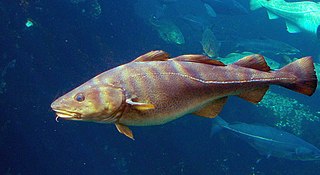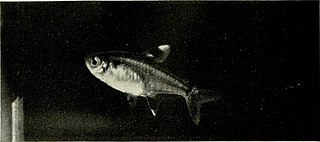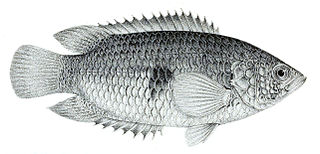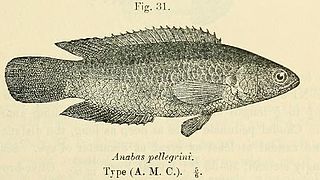
Cod is the common name for the demersal fish genus Gadus, belonging to the family Gadidae. Cod is also used as part of the common name for a number of other fish species, and one species that belongs to genus Gadus is commonly not called cod.

Herring are forage fish, mostly belonging to the family Clupeidae.

Carp are various species of oily freshwater fish from the family Cyprinidae, a very large group of fish native to Europe and Asia. While carp is consumed in many parts of the world, they are generally considered an invasive species in parts of Africa, Australia and most of the United States.

"Sardine" and "pilchard" are common names for various small, oily forage fish in the herring family Clupeidae. The term "sardine" was first used in English during the early 15th century and may come from the Mediterranean island of Sardinia, around which sardines were once abundant.

Gadus is a genus of demersal fish in the family Gadidae, commonly known as cod, although there are additional cod species in other genera. The best known member of the genus is the Atlantic cod.

The Integrated Taxonomic Information System (ITIS) is an American partnership of federal agencies designed to provide consistent and reliable information on the taxonomy of biological species. ITIS was originally formed in 1996 as an interagency group within the US federal government, involving several US federal agencies, and has now become an international body, with Canadian and Mexican government agencies participating. The database draws from a large community of taxonomic experts. Primary content staff are housed at the Smithsonian National Museum of Natural History and IT services are provided by a US Geological Survey facility in Denver. The primary focus of ITIS is North American species, but many biological groups exist worldwide and ITIS collaborates with other agencies to increase its global coverage.
Anostomus is a small genus of fish in the family Anostomidae found in South America. They are found in the Orinoco and Amazon Basin, as well as various rivers in the Guianas. The genus currently contains five described species. Petulanos was until recently included here.

Snipe eels are a family, Nemichthyidae, of eels that consists of nine species in three genera. They are pelagic fishes, found in every ocean, mostly at depths of 300–600 m but sometimes as deep as 4000 m. Depending on the species, adults may reach 1–2 m (39–79 in) in length, yet they weigh only 80-400 g. They are distinguished by their very slender jaws that separate toward the tips as the upper jaw curves upward. The jaws appear similar to the beak of the bird called the snipe. Snipe eels are oviparous, and the juveniles, called Leptocephali, do not resemble the adults but have oval, leaf-shaped and transparent bodies. Different species of snipe eel have different shapes, sizes and colors. The similarly named bobtail snipe eel is actually in a different family and represented by two species, the black Cyema atrum and the bright red Neocyema erythrosoma.

An anchovy is a small, common forage fish of the family Engraulidae. Most species are found in marine waters, but several will enter brackish water, and some in South America are restricted to fresh water.

Copeina guttata is one of two fish species in the genus Copeina, which is in the family Lebiasinidae.

Microctenopoma nanum, the dwarf ctenopoma, is a fish in the family Anabantidae found in southern Cameroon, Gabon, and the Congo Basin of Africa. It grows to 8.0 cm in total length.
Microctenopoma intermedium is a fish in the family Anabantidae found in the Okavango, upper and lower Zambezi, and Kafue Rivers, and St. Lucia basin, as well as in the southern tributaries of the Congo system. It grows to 6.2 cm in total length.
Microctenopoma nigricans is a fish in the family Anabantidae found in the Lulua and Sankuru River drainages, tributaries of the Kasai River in south-central Democratic Republic of Congo. It grows to 6.8 cm in standard length.

Ctenopoma maculatum is a fish in the family Anabantidae found in the coastal rivers from South Cameroon to the Democratic Republic of the Congo in the Chad, Ogoué, and Congo River basins. They grow to 20.0 cm in total length.

Ctenopoma pellegrini is a fish in the family Anabantidae found in the Congo River basin of Africa. It grows to 11.2 cm in total length for a male/unsexed specimen. This species was formally described by the British-Belgian ichthyologist George Albert Boulenger in 1902 with the type locality given as Yembe River at Banzyville in the Democratic Republic of Congo. Boulenger honoured the French ichthyologist Jacques Pellegrin (1873-1944).
Microctenopoma ocellifer is a fish in the family Anabantidae found in the Congo River basin of Africa. It grows to 5.4 cm in total length.
Anostomus ternetzi is a fish in the family Anostomidae.

Schizodon fasciatus is a fish in the family Anostomidae.
Schizodon intermedius is a fish in the family Anostomidae.
Ptomaphagus brevior is a species of small carrion beetle in the family Leiodidae. It is found in North America.












